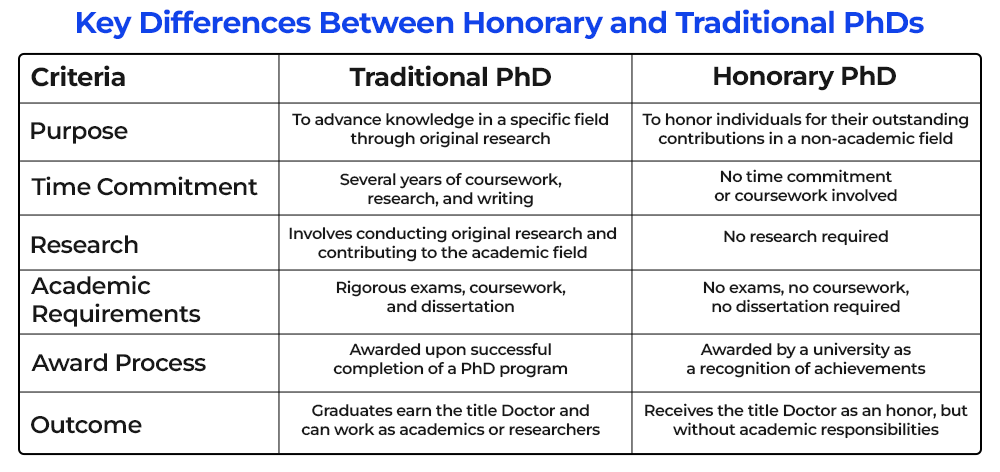Expert Interviews
- University Reviews
- Career Guide
 Video Counseling
Video CounselingImportant Facts
- Ask any Question - CV Forum

Why Honorary Doctorates Matter In Today’s World?
Komal Jain Jul 15, 2025 1.1K Reads

In today’s world, everybody wants to be successful and wants to earn a higher salary, and for that, they can do various online courses that are also valid in India, and one of the best programs is an Honorary Doctorate. However, this program is a symbolic award that is given to the candidate by the university who has done work and made some contribution in the same field or subject for many years.
However, if an Indian student wants to do an Honorary Doctorate program, then it can be done through an online mode, as there are many foreign universities that are offering this course. An Honorary Doctorate is an achievement for an outstanding contribution to a field or society.
Before applying for an Honorary Doctorate, it is important to know about this program and its advantages as well. In this blog, you will be provided with detailed information on what is Honorary Doctorate is and how you can apply for it.
What is an Honorary Doctorate?
An Honorary Doctorate is a symbolic award the university grants to a candidate who is working in a specific field or subject and has given many years of service in that field or subject and has also contributed to that field or society in some way. This is a historical process where they do not do research, or examination, but are recognized for excellence, achievement, or impact.
Key Highlights of Honorary Doctorate
- It is a recognition of contributions that have been given to the candidate to acknowledge their achievements in fields like arts, science, public service, and more.
- Honorary Doctorate is not the same as the traditional doctorate program, in which the student needs to research a specific case study or thesis.
- After receiving the Honorary Doctorate, you will get the Dr. title in your name.
- The candidate from various backgrounds, including will be awarded for presidents, world leaders, celebrities, scientists, artists, and others.
What is the Difference between a PhD and an Honorary PhD?
When you think of a PhD, you might be thinking about years of research and study, then an eventual dissertation to provide original knowledge for that specific field. But what about an Honorary PhD? It sounds similar, but the two are different in purpose, process, and worth. In this blog, you will learn the difference between a PhD and an Honorary PhD.
What is a Traditional PhD?
A PhD is the highest academic degree that a student can achieve in various fields and advance their knowledge and skills. If you want to pursue this program, then it requires a lot of research, and once you complete the thesis then you will add Dr title in your name. To get a Phd, you need to complete your master’s first from a prestigious university.
Key Characteristics of a Traditional PhD:
- Length and Commitment: A traditional PhD can last for about 3 to 8 years, depending on the particular path that the research entails, and for the individual, etc. PhD's don't leave much room for anything else; it takes an immense commitment to the act of generating knowledge academically.
- Research and Original Contribution: A PhD's purpose is to research different original content that adds some new knowledge or insight to the academic community. This research will be compiled, reviewed by experts, and can later be published in a dissertation form.
- Coursework and Exam: Unlike other professional degrees, some PhD programs may have no or limited coursework components, or if they do, several require students to pass one or more comprehensive exams in their specific field before they can begin their research.
- Professional Development: PhD candidates might also be involved in teaching undergraduates, publishing materials, or showing their work to academics. Each academic involvement develops new and different skills, but ultimately leads to developing as researchers, not just educators.
- Awarding Body: A traditional PhD is awarded by an accredited university after being evaluated through a formal process of assessment and the defense of the dissertation.
What is an Honorary PhD?
An Honorary PhD is an honorary academic degree given by a university or institution to individuals who have contributed to society in noteworthy ways in areas of philanthropy, business, politics, science, or the arts. Essentially, it is a way for academic institutions to honor individuals for their contributions, even if they have not fulfilled the equivalent requirements of a regular PhD program.
Key Characteristics of an Honorary PhD:
- No Coursework or Research: As opposed to a traditional PhD, an honorary PhD does not require the recipient to complete any coursework, write a dissertation, or perform any research. An honorary PhD is simply an honorary title for making important contributions in a specific field.
- Recognition of Contributions: The individuals who receive honorary PhDs typically have high achievements in a field, such as publicly known scientists, authors, social activists, or public figures. The awarding institution is recognizing the lifetime of work and contributions of the recipient.
- Awarding Process: Honorary PhDs are typically given by a university or academic institution during a formal process, typically during graduation or during a special occasion. Honorary PhDs are typically advised or recommended by the faculty or administration of the academic institution and voted upon by the academic institution's governing body.
- Symbolic Honor: While the honorary doctorate is prestigious and respected, it does not give the recipient any rights to practice as an academic or researcher, and is a symbolic honor recognizing extreme contributions, rather than an academic honor.
- No additional obligations: Recipients of honorary PhDs are not required to do any academic work, such as teaching or publishing academic articles. A recipient who receives an honorary PhD is simply receiving an honor for contributions.
Key Differences Between Honorary and Traditional PhDs

Why Do Universities Award Honorary PhDs?
Honorary PhDs are awarded by universities for many different reasons. It is a way to honor those who have achieved excellence in their careers and have made a meaningful impact. Some common examples are:
- Leadership: Political leaders, activists, and philanthropists who have provided leadership to promote social causes or meaningful contributions to broader global issues.
- Contributions to Arts and Culture: Celebrities, artists, musicians, and writers whose work has pushed back the boundaries of culture, society, and made a lasting difference.
- Scientific and Technological Leader: Leaders in technology, medicine, and science whose discoveries have made a difference in people's lives.
- Philanthropic Leaders: Individuals who have dedicated their lives to social good, through charitable work or non-profit organizations.
Why Do People pursue online Honorary PhDs?
While some people might consider an honorary PhD as simply ceremonial, it is still an acknowledgement that is noteworthy and very valid in meaning. For the recipient, an honorary PhD often gives:
- Public Recognition: It gives prominent visibility to the individual's influences and accomplishments, often raising more awareness of the individual's work.
- Cultural Value: Receiving an honorary doctorate, even an honorary doctorate, can be an impactful cultural cue, reaffirming that the individual's work aligns positively with the criteria attributes upheld by the academic community.
- Legacy and Influence: For some, it is about establishing a legacy in their field that endures, be it in the arts, politics, or business.
Things to Consider
While honorary and traditional PhDs share the Doctor title, there are significant differences in the pathways that lead to earning that Privilege. A traditional, or earned, PhD culminates a process of years of reading, writing, research, and intense academic discipline. An honorary PhD is awarded to honor someone for their extraordinary contribution to something socially/theoretically, as exceptional and far exceeding excellence, contribution, or academic study, and incredible value and worth outside the traditional academic setting. One is earned with effort in excellence, while one is granted with honor. Both PhDs are regarded with great prestige and can be life-changing to a great many who receive them.
How can I do an Honorary PhD?
The Honorary PhD is an academic award that is given to the candidate who has been doing work in a specific field or subject. However, if you want to pursue this program, then it can be done, and for that, you need to submit the application to the university. You might need to pay some fees that depend on the university at which you are taking admission.
However, in India, the candidate cannot apply for an Honorary PhD, but many foreign universities offer this program through an online mode, and it is also valid in India. EIMT University is one of the top-ranked universities that is based in Switzerland and France. EIMT University is approved by ACBSP, DRPF, QAHE, and EURASHE. If you pursue an honorary PhD from here, then it will be valid in India and other countries as well.
What Are the Benefits of Pursuing an Honorary PhD?
The title Doctor is afforded respect in the academic and professional world. Most people link this title to years of academic research, often in domains of academia other than just university positions. However, there is a possible avenue explicitly seeking this title...Doctor. An Honourary Doctorate (or Honorary PhD) is awarded to individuals who have made substantial contributions to a designated area, community, or society, without necessitating the conscious sacrifice of the academic requirements for a conventional doctoral degree. Despite not being earned via courses and a dissertation, the honorary doctorate has value and can open doors you may not anticipate, should you receive or start pursuing it. Let’s discuss the actual value of an honorary PhD or seeking one.
1. Recognition for Life Achievements
The most profound benefit of an honorary PhD is formal recognition of your impact in a given area. Whether it’s humanitarian work, business innovation, artistic excellence, or social activism, an honorary doctorate validates your contributions on a prestigious platform usually granted by a university that recognizes your real-world achievements.
2. Increased Credibility and Authority
Holding an honorary PhD can boost your credibility in professional and public circles. While it doesn’t make you an academic scholar in the traditional sense, it does reinforce your authority in your field of influence. People are more likely to trust your voice, whether you’re speaking at a conference, publishing a book, or leading a company.
3. Public Speaking and Media Opportunities
Honorary doctorates often open the door to keynote speeches, guest lectures, interviews, and even media appearances. Institutions and organizations may invite you to share your journey or insights, often leveraging your title for publicity or inspiration.
This enhanced visibility can be especially valuable for:
- Thought leaders
- Entrepreneurs
- Artists or entertainers
- Activists and philanthropists
4. Networking and Academic Access
Though honorary degrees don’t grant academic privileges like tenure or teaching positions, they can help build bridges into the academic world. Recipients are often welcomed into university circles, giving access to exclusive events, networks, and even advisory roles.
You may also be invited to mentor students or collaborate with academic researchers, thereby expanding your influence beyond your original sphere.
5. Boost for Personal Brand or Business
Let’s be honesttitles matter. Being referred to as Dr. can significantly boost your brand, especially in areas like consulting, public speaking, coaching, or authorship. It adds gravitas and can even be a differentiator in competitive industries.
6. Motivation for Others
An honorary PhD doesn’t just celebrate your pastit inspires others. It shows that impact matters as much as intellect. For young professionals, creatives, or activists, it can be proof that their non-traditional paths are also valued by the academic world.
Things to Remember: Understanding the Scope
While there are clear benefits, it’s important to understand what an honorary PhD is not:
- It does not equate to an earned academic doctorate (you can’t use it for academic tenure or positions requiring peer-reviewed research).
- Not all institutions offering honorary doctorates are credible. Be cautious of degree mills that offer such titles for a fee without merit.
Always ensure the degree is from a reputable and accredited institution:

Conclusion
An honorary PhD is much more than a title; it is a badge of recognition for a life devoted to excellence, service, or innovation for the community good. Whether you are a business leader, social changemaker, or creator, obtaining or advancing recognition for an honorary doctorate could elevate your platform, create new opportunities, and provide a moment of contemplation of how far your work has traveled.
In a world that often values formal credentials, the honorary PhD will help you in grabbing the best opportunities that are waiting for you.
FAQs (Frequently Asked Questions)
An Honorary PhD (Doctor of Philosophy) is an academic degree conferred by a university to recognize individuals for their extraordinary achievements in a field or society, without completing traditional coursework or research associated with an earned academic degree.
Honorary PhDs are typically awarded to notable public figures, philanthropists, scientists, artists, leaders of industry, or activists, that have made notable contributions, either in their profession or in the public good.
An earned PhD requires several years of formal study, embarkation on original research, write, and defend a dissertation. An Honorary PhD is a recognition of achievement conferred to someone who has distinguished themselves and does not have academic requirements.
This is a topic of debate. In theory a recipient may use Doctor, but it is observed to be most appropriate to use it for honorary or ceremonial occasions, if at all. Most recipients do not use the title in their professional capacity, even when recognized in an academic role.
Yes, an Honorary PhD is a real honorary academic degree, but it does not have the same
Yes, you can list it under "Honors and Awards" or similar headings; however, it must be clear that it is honorary in nature so that others do not mistakenly assume it was earned through academic study.
In general, no. Honorary degrees do not afford any academic/teaching rights such as faculty status or the right to supervise graduate research. They are purely honourific.
In most cases, no. Most reputable universities do not accept applications for honorary degrees. Individuals are usually nominated for honorary degrees by faculty or trustees and chosen after an extensive, rigorous review and selection process.
Honorary PhDs can be awarded in many disciplines: humanities, sciences, arts, law, medicine, business, and public service. Also, some universities award honorary degrees with the distinction of specific names such as, for example Doctor of Humane Letters (or L.H.D. in Latin), Doctor of Laws (or LL.D. in Latin).
Yes, it can be controversial if honorary degrees are given to celebrities, politicians, public figures and/or donors when there are no obvious academic or social merits to a degree. Critics say this dilutes the value of academic degrees or are mistaken as some sort of PR exercise.

By Komal Jain
5 Years of Experience / Storyteller / Research-driven Writer
Passionate about digital marketing with a creative flair for content creation.Experienced Always eager to learn, grow, and make a meaningful impact in the digital space.
Every query is essential.
Our team of experts, or experienced individuals, will answer it within 24 hours.
Recommended for you
Tired of dealing with call centers!
Get a professional advisor for Career!
LIFETIME FREE
Rs.1499(Exclusive offer for today)

Pooja
MBA 7 yrs exp

Sarthak
M.Com 4 yrs exp

Kapil Gupta
MCA 5 yrs exp
or



Career Finder
(Career Suitability Test)
Explore and Find out your Most Suitable Career Path. Get Started with our Career Finder Tool Now!
ROI Calculator
Find out the expected salary, costs, and ROI of your chosen online university with our free calculator.
